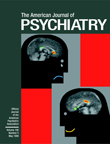Olanzapine-Induced Obsessive-Compulsive Disorder
To the Editor: Olanzapine is a new atypical antipsychotic drug with antidopaminergic and antiserotonergic properties. Two other atypical neuroleptic agents, clozapine and risperidone, also have antiserotonergic activity and may worsen obsessive-compulsive disorder (OCD) symptoms or precipitate de novo OCD in patients being treated for schizophrenia. Baker et al. (1) published a small placebo-controlled study showing that olanzapine does not significantly affect OCD. However, Morrison et al. (2) reported a case of OCD that worsened after treatment with olanzapine. This patient previously experienced worsening OCD symptoms when treated with both clozapine and risperidone. So far, to our knowledge, no case of olanzapine-induced de novo OCD has been reported. We wish to report two such cases.
Mr. A began treatment for schizophrenia in 1994. He received a dose of risperidone (at 3–6 mg/day) for a year. No symptoms of OCD were noted during this time. However, intensive evaluation revealed that since childhood, Mr. A had periodically felt himself driven to say obscene words. Such episodes were isolated and not a part of OCD or Tourette’s disorder, nor were they exacerbated by risperidone. In 1998, treatment was changed to a dose of olanzapine (at 15 mg/day) because of akathisia and persistent psychotic symptoms. Both disappeared, but 14 days after starting to take olanzapine, he developed a clear OCD, repeating words in his head and spending a tremendous amount of time checking doors. These OCD symptoms disappeared with fluoxetine; therefore, olanzapine treatment could be continued unchanged.
Mr. B, a 27-year-old man, had been treated for schizophrenia since 1994. Risperidone was introduced after an acute episode in 1997 and increased to a dose of 8 mg/day. Five months later he was switched to olanzapine, up to 25 mg/day, because of persistent psychotic symptoms. Mr. B never previously complained of symptoms related to OCD. Within 3 months he demonstrated a clear OCD, isolating himself, washing repeatedly, checking doors and the alarm system, as well as suffering from impulsion phobias. However, he had no recurrence of psychotic symptoms. Once treated with a regimen of clomipramine, at 150 mg/day, Mr. B experienced a remarkable reduction of OCD symptoms.
Clearly, Mr. B developed de novo OCD with the introduction of olanzapine, whereas Mr. A experienced one undisturbing, obsession-like symptom before olanzapine treatment. Olanzapine had no other side effects. We believe that these cases are of particular interest because of the absence of OCD symptoms during risperidone therapy and the appearance of clear OCD when treated with olanzapine. We chose to treat secondary OCD with standard OCD therapy. This was efficacious and allowed us to continue the antipsychotic treatment as previously prescribed. Is it possible, then, given the variability of responses seen among atypical antipsychotic drugs, that a simple change to another atypical neuroleptic drug could result in drug-induced OCD? Considering the continually expanding arsenal of atypical antipsychotic drugs, the answer to this question could be of particular importance with regard to patients with secondary OCD who only partially respond to standard OCD treatment.
1. Baker RW, Ames D, Umbricht DS, Chengappa KN, Schooler NR: Obsessive-compulsive symptoms in schizophrenia: a comparison of olanzapine and placebo. Psychopharmacol Bull 1996; 32:89–93Medline, Google Scholar
2. Morrison D, Clark D, Goldfarb E, McCoy L: Worsening of obsessive-compulsive symptoms following treatment with olanzapine (letter). Am J Psychiatry 1998; 155:855Medline, Google Scholar



